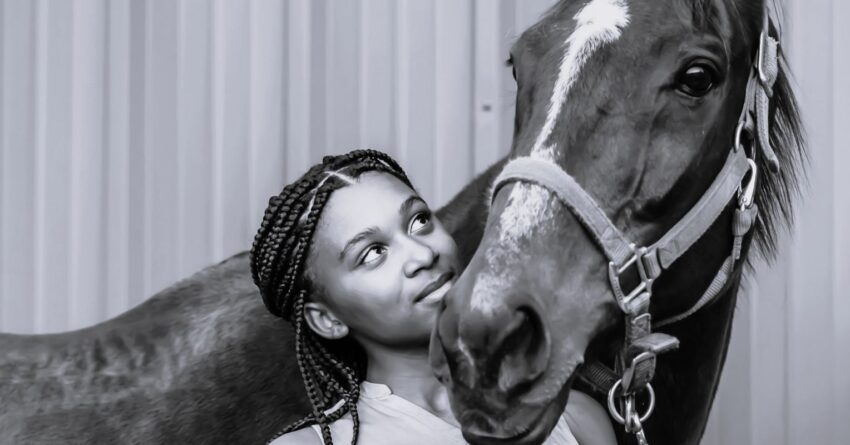Equestrians, like other sports enthusiasts, love their sport. We love riding and being part of the horse community. However, anxiety can undercut much of this joy and limit the pursuit of our passions and goals. I know many equestrians who want to show but never do because of their discomfort riding in front of others and their fear of being judged negatively by their peers.
Similarly, many riders hold themselves to unrealistically high standards and compare themselves negatively to others. As a result, they feel inferior and are reluctant to put in the many hours it takes to improve in this sport. Other riders avoid riding entirely due to concerns about getting injured. Many riders with such concerns settle for watching their trainers ride and develop their beloved mounts, even though they desperately want to feel comfortable enough to ride.

Alisa Dyson/Pixabay
What is actually happening when you experience anxiety—equestrian-related anxiety or any other form?
In simple terms, anxiety tends to result when a person is in a situation in which an unwanted outcome is anticipated, even though that negative outcome is not a given in that situation. Anxiety problems are common worldwide: A survey conducted by the Harvard Medical School (2017) found that 31 percent of the population suffers from some type of anxiety problem in their lifetime. We know a lot about the various factors that predispose individuals to anxiety and, fortunately, about how to help people overcome anxiety. No one should ever feel ashamed, weak, or less than because they experience anxiety.
With respect to the specifics of equestrian-related anxiety, here is an example. Say you are warming up at a show and feel slightly anxious. Your thoughts may automatically go to extreme negative scenarios: “I’m anxious… It’s getting worse. What if it gets so bad that I can’t remember my test? I’ll go off course, the judge will ring me out, and I won’t be able to get through the rest of the test. I will feel so embarrassed; everyone will see it. They’ll think I’m a bad rider who should not be in the show ring.”
Thoughts like that strongly influence our emotional state. Often, these kinds of anxious thoughts “take off” with us, like a bolting horse. How would you feel if you were holding the thoughts in this example? Anxious, right? And all that is happening within you before any negative outcomes can even occur!
Anxiety can be a powerful and unpleasant emotional state. People tend to want to quickly change their behavior so they feel less anxious and to make it less likely that the feared outcome will occur. However, the behaviors you do to keep yourself safe and calm (e.g., tightening your reins or seat, avoiding a spooky spot in the arena) actually feed and maintain your anxiety. They might help for a moment, but in the long run, they increase your anxiety.
Equestrian sport is unique in that there are two psyches involved: equestrian and human. Your behaviors affect your horse, and vice versa. When you engage in behaviors to quell your anxiety, you telegraph to your horse that there is something to be concerned about. Therefore, you may unintentionally teach your horse to become more anxious. It’s a frustrating cycle!
Fortunately, there are effective ways to conquer anxiety.
For over 20 years as a licensed clinical psychologist, I have practiced cognitive behavioral therapy (CBT) to treat individuals with anxiety problems. Extensive research has shown that CBT has the best track record of any type of therapy for anxiety. The good news is that CBT can readily be applied to the anxiety experienced by sportspersons, including equestrians.
The basic process of CBT for anxiety problems involves identifying problematic thinking patterns, correcting those thinking errors, and adjusting specific behaviors. During CBT, you learn about the specific thoughts you have and the situations in which your anxiety is triggered, as well as the avoidance and safety behaviors that unwittingly maintain your anxiety. You then practice being in each situation that triggers anxiety while at the same time not engaging in the behaviors you do to keep you safe. This is called exposure therapy. Exposures allow the brain to rewire, which is an essential element in conquering anxiety.
Yes, this process takes some work and courage on the front end. The good news is that you can go at your own pace. The starting point might be lengthening your reins by one inch (or even half an inch) for five meters of a circle and gradually practicing that over greater distances and conditions. It doesn’t matter where you start, just that you gradually change your behaviors and stick to it.
In my experience, people who do exposures are surprised by the rapid progress they make. They quickly learn how effective exposures are in reducing and managing anxiety. If you undertake CBT, I think you will find that you and your horse are much happier, and performance will improve for both horse and rider.
